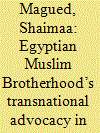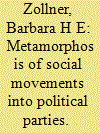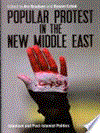| Srl | Item |
| 1 |
ID:
130313


|
|
|
| 2 |
ID:
160046


|
|
|
|
|
| Summary/Abstract |
This study examines the Egyptian Muslim Brotherhood’s transnational media advocacy as a shift in the Islamists’ political participation in general and the Brothers’ in particular. The article argues that the Brothers created their own TV channels in order to challenge the new regime’s legitimacy after 3 July 2013 by taking advantage of a sympathetic political environment in Turkey. Their media advocacy embraced a collective Islamic identity in its denunciation of the Sisi regime and called for a democratic restitution as a common Egyptian cause. Based on interviews conducted with TV presenters and a content analysis of the expatriates’ TV channels, this study presents transnational advocacy as a novelty in the Islamists’ repertoire of action.
|
|
|
|
|
|
|
|
|
|
|
|
|
|
|
|
| 3 |
ID:
181103


|
|
|
|
|
| Summary/Abstract |
The article studies newly established parties with roots in social movements. Using the post-Spring development of Egyptian Muslim Brotherhood and Tunisian al-Nahda as in-depth empirical cases, the study reflects on prevalent theoretical explanations for the transitions of social movements into political parties. The paper argues that extant literature on party system institutionalization and the development of social movement organizations do not adequately explain the driving factors for the transition process of movements into parties. A focus on party systems does not take note of the dynamics of movement-party relations, while social movement theory remains steeped in conceptions of institutional evolution and ‘natural progression’ in politics. When rethinking party institutionalization, it needs to be recognized that it is a precarious process during which features of social movement activism overlap with the formalized engagement that characterizes political parties. The comparative study of the Muslim Brotherhood-led Freedom and Justice Party and the Tunisian al-Nahda Movement and its al-Nahda Party exemplifies that the degree to which leading parties emancipate themselves from the guardianship of their ‘mother-organizations’ is an essential factor for democratic state-building.
|
|
|
|
|
|
|
|
|
|
|
|
|
|
|
|
| 4 |
ID:
152712


|
|
|
|
|
| Publication |
London, I B Tauris, 2014.
|
| Description |
xxiv, 260p.hbk
|
| Standard Number |
9781780769134
|
|
|
|
|
|
|
|
|
|
|
|
Copies: C:1/I:0,R:0,Q:0
Circulation
| Accession# | Call# | Current Location | Status | Policy | Location |
| 059026 | 909.0956/KNU 059026 | Main | On Shelf | General | |
|
|
|
|
| 5 |
ID:
092318


|
|
|
|
|
| Publication |
2009.
|
| Summary/Abstract |
Under what conditions did the social movement the Muslim Brotherhood resort to the use of terrorist tactics? Three factors led to the radicalization of the Muslim Brotherhood. Hasan al-Banna, the charismatic leader (as defined by Max Weber) and founder of the Muslim Brotherhood commanded the Brotherhood to use terrorism. Secondly, the Muslim Brotherhood radicalized because Hasan al-Banna himself was radicalized throughout time. The last factor that led to the radicalization occurred because the Brotherhood became more and more frustrated after each attempt to reform the Egyptian population failed. This accumulation of frustration led to the use of terrorist tactics.
|
|
|
|
|
|
|
|
|
|
|
|
|
|
|
|